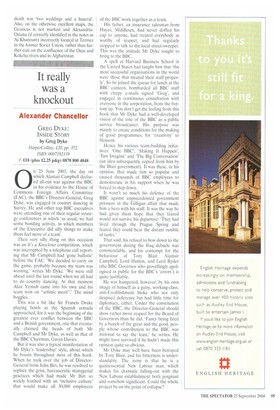It really was a knockout
Alexander Chancellor
GREG DYKE: INSIDE STORY by Greg Dyke HarperCollins, £20, pp. 352 ISBN 0007192339 ' £18 (plus £2.25 p&p) 0870 800 4848 0 n 25 June 2003, the day on which Alastair Campbell declared all-out war against the BBC in his evidence to the House of Commons Foreign Affairs Committee (FAC), the BBC's Director-General, Greg Dyke, was engaged in country dancing in Surrey. He and other top BBC executives were attending one of their regular strategy conferences at which 'as usual, we had some bonding activity, in which members of the Executive did silly things to make them feel more of a team'.
Their very silly thing on this occasion was an It's a Knockout competition, which was interrupted by a telephone call reporting that Mr Campbell had 'gone ballistic' before the FAC. 'We decided to carry on the game, probably because my team was winning,' writes Mr Dyke. We were still ahead until the last round when we all had to do country dancing. At that moment Alan Yentob came into his own and his team won on "artistic merit".' The mind boggles.
This was a bit like Sir Francis Drake playing bowls as the Spanish armada approached, for it was the beginning of the greatest ever conflict between the BBC and a British government, one that eventually claimed the heads of both Mr Campbell and Mr Dyke, as well as that of the BBC Chairman, Gavyn Davies.
But it was also a typical manifestation of Mr Dyke's 'leadership' style, about which he boasts throughout most of this book. When he took over the job of DirectorGeneral from John Birt, he was resolved to replace the grim, bureaucratic managerial practices which had made Mr Birt so widely loathed with an 'inclusive culture' that would make all 30,000 employees of the BBC work together as a team.
His father, an insurance salesman from Hayes, Middlesex, had never doffed his cap to anyone, had treated everybody as worthy of respect, and had regularly stopped to talk to the local street-sweeper. This was the attitude Mr Dyke sought to bring to the BBC.
A spell at Harvard Business School in the United States had taught him that 'the most successful organisations in the world were those that treated their staff properly'. So he joined the queue for lunch at the BBC canteen, bombarded all BBC staff with chirpy e-mails signed 'Greg% and engaged in continuous consultation with everyone in the corporation, from the bottom up. You don't get the feeling from this book that Mr Dyke had a well-developed vision of the role of the BBC as a public service broadcaster. His purpose was mainly to create conditions for the making of good programmes, for 'creativity' to blossom.
Hence his various team-building initiatives: 'One BBC', 'Making It Happen', 'Just Imagine' and 'The Big Conversation' (an idea subsequently copied from him by the Blair government). It was these, in his opinion, that made him so popular and caused thousands of BBC employees to demonstrate in his support when he was forced to step down.
It wasn't so much his defence of the BBC against unprecedented government pressure in the Gilligan affair that made him a hero with his staff, It was the way he had given them hope that they feared would not survive his departure: 'They had lived through the Prague Spring and feared they could hear the distant rumble of tanks.'
That said, his refusal to bow down to the government during the Iraq debacle was commendable, and his contempt for the behaviour of Tony Blair, Alastair Campbell, Lord Hutton, and Lord Ryder (the BBC Governor who grovellingly apologised in public for the BBC's 'errors') is quite justifiable.
He was hampered, however, by his own image of himself as a gutsy, working-class, anti-Establishment bloke who not only despised deference but had little time for diplomacy, either. Under the constitution of the BBC, the Director-General should show rather more respect for the Board of Governors than he did. 'Fancy being fired by a bunch of the great and the good, people whose contribution to the BBC was minimal to say the least,' he writes. He might have survived if he hadn't made this opinion quite so obvious.
Mr Dyke may well have been betrayed by Tony Blair, and his bitterness is understandable. The irony is that he is a quintessential New Labour man, which makes his dramatic falling-out with the New Labour establishment both poignant and somehow significant. Could the whole project be on the point of collapse?


























































































 Previous page
Previous page